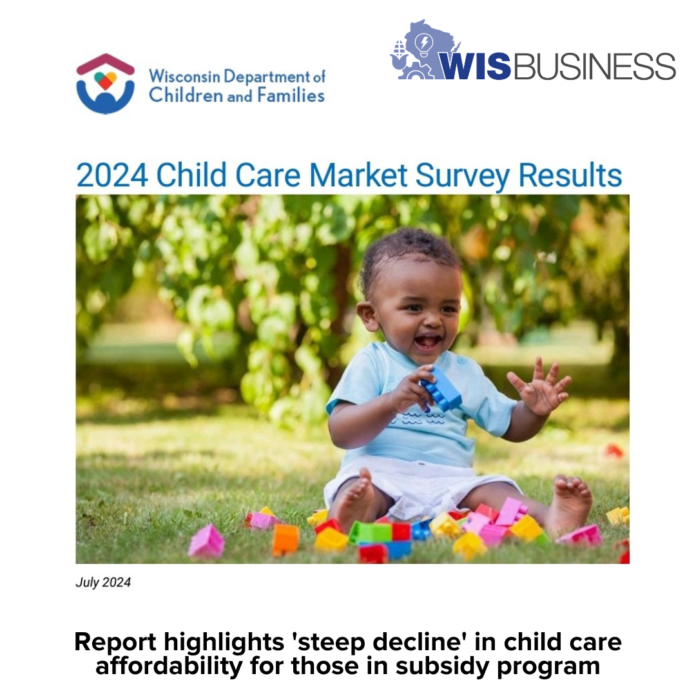The rising cost of child care in the state has driven a “steep decline” in affordability for those participating in the Wisconsin Shares child care subsidy program for the working poor, state officials announced.
The Department of Children and Families and Gov. Tony Evers yesterday released the results of the 2024 Market Rate Survey, highlighting a “larger-than-predicted” increase in the cost of child care between 2022 and 2023.
The increase in monthly child care costs was 11% for families with an infant in center-based care, while the increase was 14% for those with an infant in family-based care, according to the report. Both figures are well above the 4.9% inflation rate for that period, the release notes.
In a recent online briefing, DCF officials highlighted the drop in affordability for Wisconsin Shares participants due to this change. They noted affordability in this context means the maximum subsidy under the program is at or above the price of the slot at a child care provider.
In 2023, just 50% of slots were considered affordable under this definition, compared to 74% in 2022. By comparison, both the federal Administration for Children and Families and Wisconsin law have 75% of child care slots being affordable as their target threshold, the report notes.
Wisconsin Shares provides subsidies to families with an initial gross income of up to 185% of the federal poverty level, which is $57,720 this year for a family of four. Those on the program are responsible for a copay based on their income, family size and the number of children in care.
During the briefing, DCF Secretary Emilie Amundson pointed to reduced funding for the Child Care Counts Program as a compounding factor for issues in the Wisconsin Shares program.
The two are separate programs, and Evers used federal pandemic funds to create Child Care Counts to provide subsidies to providers that can be used to recruit and retain staff, among other things.
The Child Care Counts payments were reduced by half in May 2023 after federal funding ended, the release notes. The guv proposed funding it with $340 million in state money in the 2023-25 budget, but GOP lawmakers rejected that proposal as well as a $1 billion workforce package Evers proposed last year that would have funded the program.
Amundson says Child Care Counts has been a “lifeline” for providers and the Market Rate Survey provides the first hard data to “show that what our providers told us would happen is indeed happening.”
“Affordability is another really pernicious issue that is affected by our failure to fund child care in the state of Wisconsin,” she said. “What we’re doing now is creating just a system of inequity. If you have the means, you will be able to pay for child care. If you do not have the means … then you are at the mercy of the kinds of increases that we’re seeing.”
She argued child care providers are “doing everything they can” to keep rates as low as possible, but said paying “below substandard wages” for child care workers is unsustainable.
Amundson said “the least we can do” is to re-estimate the subsidy amounts provided through Wisconsin Shares to match the market, noting that will take place as part of the biennial budget process about a year from now.
“What that will not do, again, is help folks with their co-pays and it will not help folks that do not qualify for Wisconsin Shares,” she said. “So we need to look outside of our normal paths of funding … to start to fill the holes that we cannot fill with the normal reestimate process.”
GOP state Sen. Van Wanggaard, R-Racine, knocked Evers following the release of yesterday’s report, saying the guy has spent $770 million in Child Care Counts to make child care more affordable and yesterday “admitted it wasn’t working.”
“Had he not vetoed the GOP child care package, we’d have more spots, and family of four would have $6,000 more to spend on child care,” Wanggaard said, referring to a package of child care bills Republican lawmakers took up last year.
See the release.






